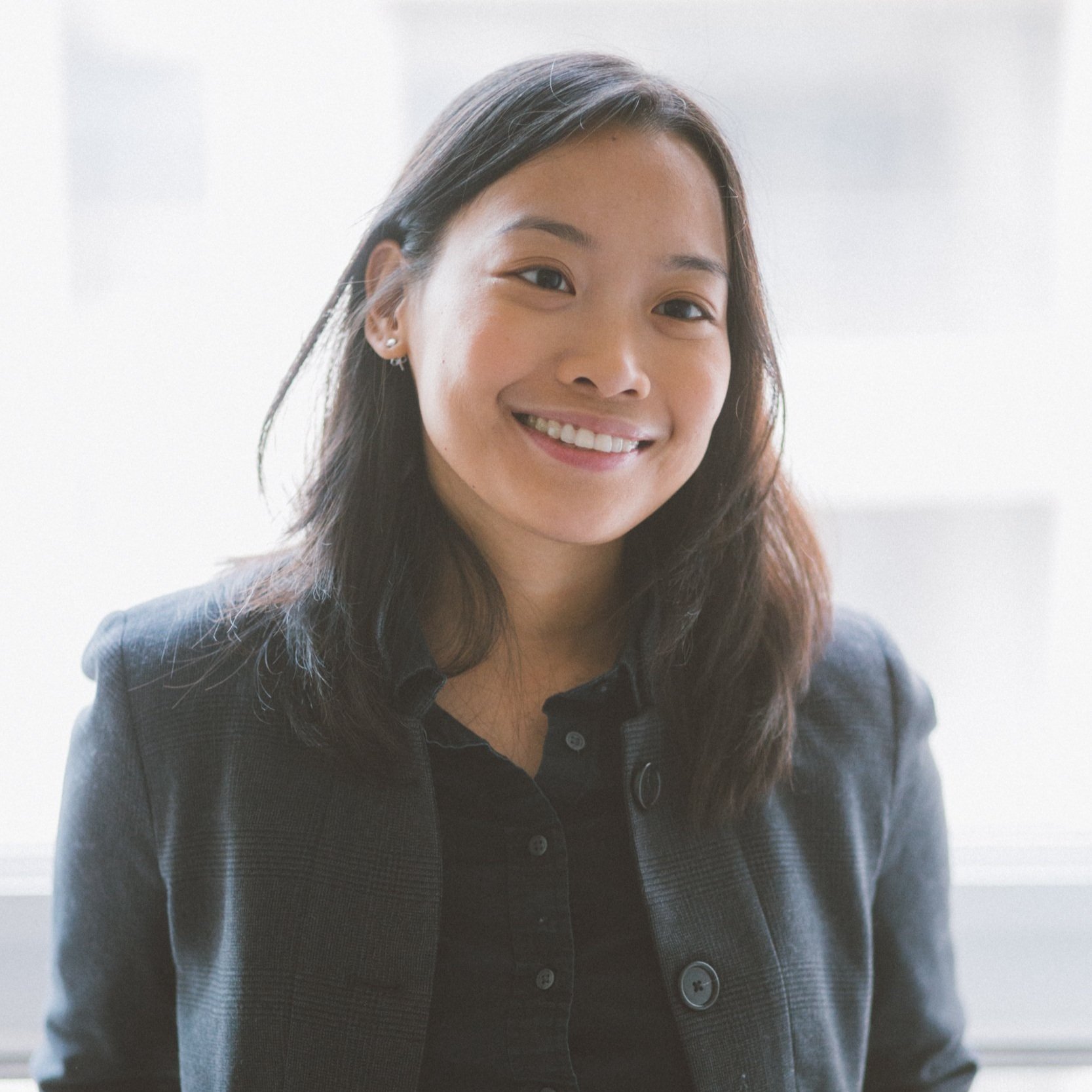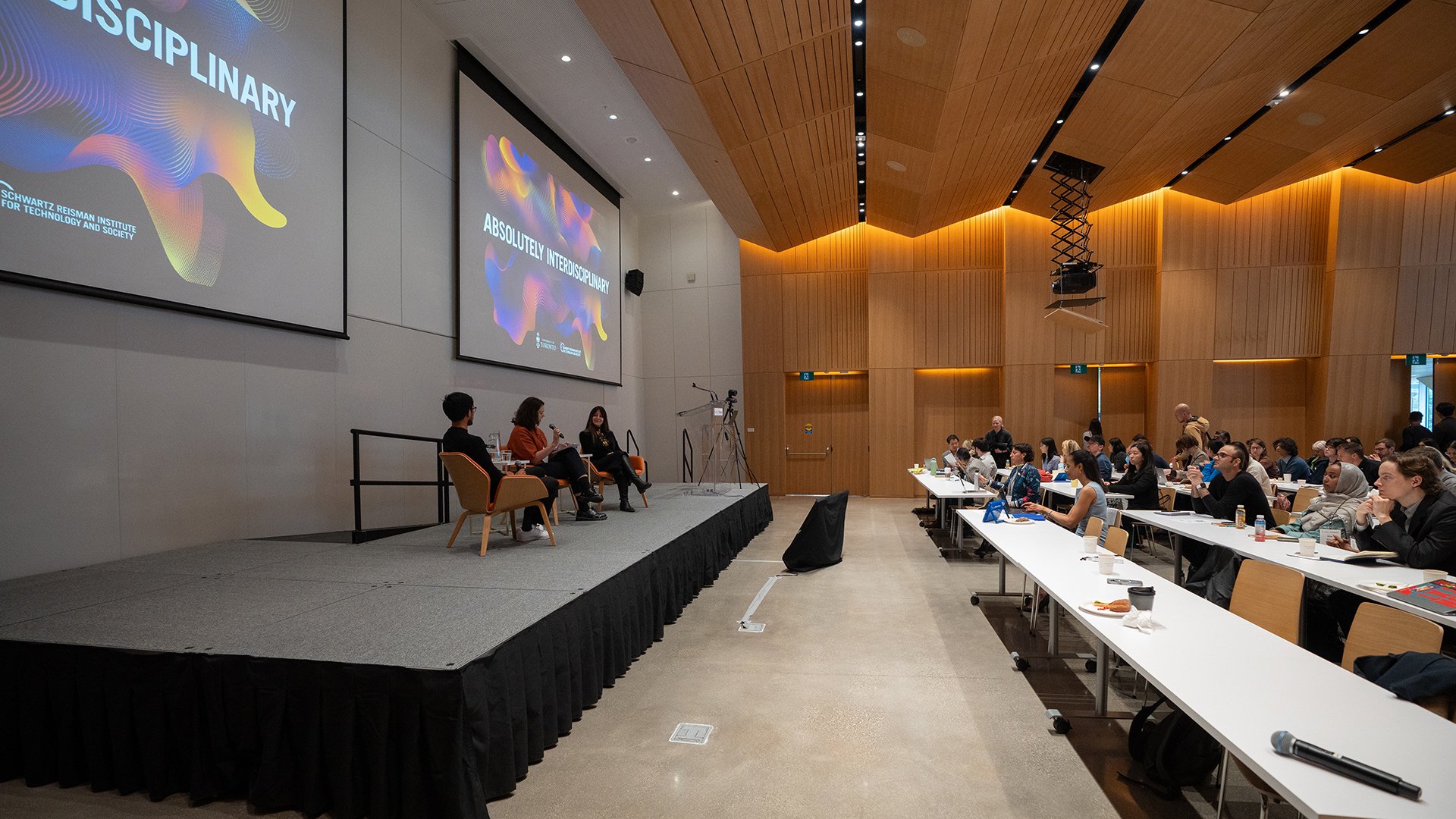SRI faculty fellows advance interdisciplinary research on the social impacts of AI
The Schwartz Reisman Institute’s 2021–23 faculty fellows explored the social implications of new technologies, foregrounding the significance of ethics, equity, and human-centred values. From left to right: Ishtiaque Ahmed, Jason Plaks, Anna Su, Rosalie Wang.
In 2023, the Schwartz Reisman Institute for Technology and Society’s (SRI) second cohort of faculty fellows completed their two-year terms, with each fellow contributing a research project offering insights into the social impacts of powerful technologies, including how artificial intelligence (AI) systems, chatbots, rehabilitation technologies, and the landscape of digital communications are transforming our world. Exploring the implications and effects of new technologies from interdisciplinary perspectives, the fellows’ projects foreground the significance of ethics, equity, and human-centred values.
In 2021, SRI awarded Schwartz Reisman Faculty Fellowships to four University of Toronto faculty members: Rosalie Wang (Department of Occupational Science and Occupational Therapy), Ishtiaque Ahmed (Department of Computer Science), Jason Plaks (Department of Psychology), and Anna Su (Faculty of Law).
Schwartz Reisman fellowships support researchers in addressing pressing concerns at the intersection of technology and society, with the goal of advancing interdisciplinarity, new fields of inquiry, regulatory innovation, and the use of AI for social good. Faculty fellows engage SRI’s community through events and initiatives that facilitate cross-disciplinary connections, furthering the Institute’s mission to be a global leader in ensuring that advanced technologies serve the betterment of all humanity.
Rosalie Wang: Advancing ethical AI in senior care
Rosalie Wang is an associate professor in U of T’s Department of Occupational Science and Occupational Therapy, where she researches the design, development, and evaluation of assistive and rehabilitation technologies. Central to her work is a focus on user-centred design, incorporating considerations of ethics and equity.
Wang’s SRI fellowship focused on how AI-enabled technologies can support well-being for people with disabilities and older people, and how assistive technologies can better support health and social care initiatives. By creating a trans-disciplinary framework to guide the ethical development and evaluation of assistive care technologies, Wang established how AI-enabled tools can be successfully integrated within an “ecosystem of care.”
Rosalie Wang
“As an occupational therapist, my aim is to facilitate people and communities of all ages and abilities to participate in and perform meaningful daily activities that support their well-being and full inclusion in society throughout the life course,” observes Wang.
Wang notes that as care innovations incorporating AI such as assistive robots, smart homes, and smart wheelchairs are increasingly developed and integrated, ethical challenges arise.
“While discourse on AI ethics in healthcare largely focuses on society and individuals—for example, concerns around bias, equity, privacy, and consent—the relational nature of care warrants greater focus on how AI will shape, and be shaped by, social networks or care ecosystems.”
Wang’s fellowship enabled her to create a culturally-diverse, transdisciplinary working group of older adults, care partners, researchers, clinicians, and entrepreneurs to co-construct experiences of care and technology use. Wang and her team are currently developing a manuscript based on her workshop findings to synthesize key values and design principles. During her fellowship, Wang also produced 14 related publications, gave 12 invited talks, and received a 2023 Teaching Award from U of T’s Rehabilitation Sciences Institute.
As Wang noted in a recent op-ed in Healthcare Management Forum, assistive technologies can “mitigate the most prominent health and social challenges of our time,” yet access remains “variable and inequitable, with unmet needs, restricted funding, and inefficiencies.” Through her scholarship, Wang is advocating for a policy vision towards a national strategy that will increase equitable access to assistive technologies.
Ishtiaque Ahmed: Diversifying AI ethics
Ishtiaque Ahmed’s research is dedicated to diversifying discourses on AI ethics by incorporating moral and ethical practices from the Global South. In his research on computing technologies, Ahmed addresses issues of faith, tradition, and unique regional histories to create a more inclusive and globally-aware framework for understanding the impacts of AI systems.
Ishtiaque Ahmed
An assistant professor in U of T’s Department of Computer Science, Ahmed directs the Third Space research group, which addresses issues faced by marginalized communities in developing countries, and is a co-organizer of the Critical Computing Seminar Series.
“Most AI technologies are failing to serve the people in the Global South, and current efforts of making AI ethical are not helping,” observes Ahmed. Through his SRI fellowship, Ahmed developed a “pluriversal ethics” for AI informed by insights from a wide range of stakeholders regarding infrastructural politics, social and ethical tensions, and challenges for development across the Indian subcontinent, Africa, the Middle East, Asia, and Latin America.
During his fellowship, Ahmed published six papers on his findings, delivered three invited talks, and fostered collaborations with Toronto Metropolitan University, Queen’s University, University of Illinois Urbana-Champaign, and Monash University. Ahmed also served as an associate chair for the ACM’s CHI Conference on Human Factors in Computing Systems, the ACM Conference On Computer-Supported Cooperative Work and Social Computing, the Association for the Advancement of Artificial Intelligence, and the IEEE Conference on Secure and Trustworthy Machine Learning.
Ahmed continues to support marginalized voices through a recent Catalyst Grant awarded by U of T’s Data Sciences Institute, to develop an AI system to address the marginalization of communities in data-centric systems, including social media platforms like Twitter.
“This project is particularly important in today’s context as the internet is inundated by misinformation and hate speech, and social media users often write posts without fact-checking or knowing their potential negative impacts,” Ahmed explains. “State-of-the-art moderation systems fall short in addressing this problem as there is not enough data from vulnerable communities to train the algorithm, nor do they have enough representation among the human moderators.”
Jason Plaks: Unveiling the moral psychology of machines
How do the ways robots interact with humans help to encourage or discourage our trust? An associate professor in U of T’s Department of Psychology, Jason Plaks used his SRI fellowship to delve into the intricacies of how psychological features—such as values, autonomy, social connections, and emotion—can influence the ways we perceive AI agents.
Jason Plaks
Employing a “Wizard of Oz” methodology—a moderated research method in which a user interacts with an interface manned by a human who controls the responses—Plaks designed four projects aimed at unravelling the psychological underpinnings of humans’ engagement with AI systems. His findings demonstrate how distinct psychological features can foster or hinder humans’ sense of anthropomorphism, trust, friendship, and moral judgement towards AI agents. Plaks has published his findings on trust in Computers in Human Behavior as well as presenting at two conferences, and has six additional manuscripts in preparation.
“Humans are interacting more and more often with AI entities that appear to pass the Turing Test,” observes Plaks. “There is a growing need to identify what key psychological characteristics an AI must display to elicit anthropomorphism, trust, and moral standing.”
Through his exploration of cognition, agency, and morals, Plaks’ research reaches to the heart of the profound question of what defines human essence, and introduces a vital perspective to ongoing discussions on the alignment problem—an area of research that explores how to ensure an AI agent’s actions match human norms and values. His research tackles a critical gap, as research in the field of human-robot interaction has historically been led by engineers and computer scientists, often overlooking crucial insights from psychology.
Anna Su: Bridging human rights and AI governance
Anna Su’s SRI fellowship research centred on the intersection of law, human rights, and digital technologies. An associate professor in the Faculty of Law, Su explored how human rights can be leveraged as a governance mechanism for AI and digital technologies, and surveyed the emerging concept of digital constitutionalism—including how the terms and conditions set by private companies shape our digital public spaces, and how a digital charter of rights could broaden existing human rights frameworks to the digital sphere and instil shared values such as equality and democracy.
Anna Su
“Traditionally, we understand constitutional law as principally limiting the state, but given the political and economic power of technology companies, the transnational nature of the digital space, and the pervasive role of technology in our lives, I want to develop some theoretical tools to understand how to make sense of this altered landscape,” observes Su. “In addition, we also have to ask about the role of human rights today and to what extent we should change our understanding of it to address these unique challenges.”
To help her students better grasp the role of international law in the governance of digital spaces, Su developed a new course as part of her fellowship, entitled “New Technologies and International Law.” She also presented her research at SRI’s Absolutely Interdisciplinary conference and served as an invited panellist at the 2022 Walter Gordon Symposium.
Su’s research contributes to strengthening SRI’s strategic objective to develop new forms of regulatory innovation that can address challenges of complexity and scope associated with powerful technologies like AI. As new technologies continue to advance, it is vital that we understand how they impact not only questions of governance and policy, but also, as Su notes, if these tools might end up changing human rights law.
How to apply for Schwartz Reisman fellowships
The Schwartz Reisman Institute offers faculty and graduate fellowships on an annual basis, and welcomes researchers from across the University of Toronto’s three campuses to apply. Faculty fellowships span two years, while graduate fellowships last for one year.
Applications for 2024 SRI fellowships will launch in early December 2023; until then, more information is available in our 2023 call for fellows. To find out about SRI’s upcoming call for fellows, please join our mailing list.












